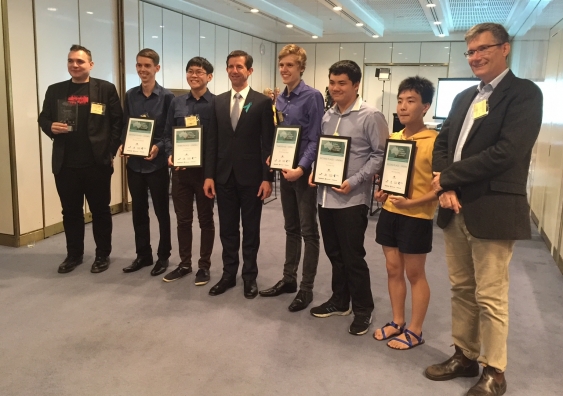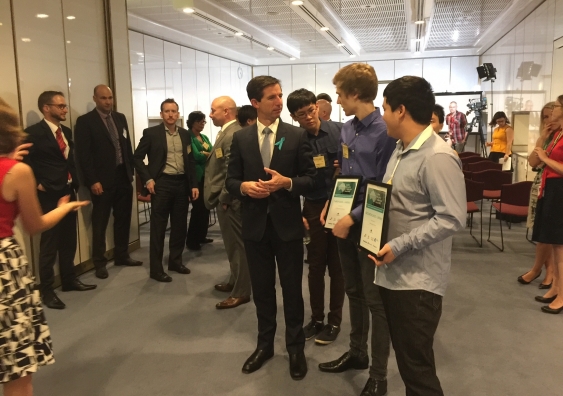Australia’s top hackers get PM’s awards
UNSW's champion student hackers have been presented with trophies at Parliament House in Canberra for their clean sweep in Australia’s toughest cyber security competition.
UNSW's champion student hackers have been presented with trophies at Parliament House in Canberra for their clean sweep in Australia’s toughest cyber security competition.

Three teams of UNSW hackers made history in 2015, taking out – for the third year in a row – 1st, 2nd and 3rd in the Australia’s toughest cyber security competition.
And those that were still in the country and hadn’t been snapped up by foreign computer giants were at Parliament House in Canberra this week to collect their trophies from Minister for Education and Training, Simon Birmingham.
The Cyber Security Challenge is a gruelling national competition in which computer students are given 24-hours to complete a series of demanding tasks that test their cyber penetration and forensic analysis skills. In the most recent competition, held in September and October, 261 students from 23 universities and TAFEs took part.
It is led by the Department of the Prime Minister and Cabinet, in partnership with the Department of Defence and businesses such as the Commonwealth Bank, Facebook, Telstra and Cisco. Its aim is to boost the number of cyber security professionals – Australia has a chronic shortage of such roles.
UNSW teams had “raised the bar” for other young Australians: “The future of cyber security in Australia is looking bright."
Last year three UNSW teams won 1st, 2nd and 3rd for the third year in a row, thanks to a dedicated team of inspiring cyber experts who lead the country’s best training ground for cyber security specialists. Industry demand has grown more than 60% in the past year, and it’s estimated that there’s a shortage of a million cyber security professionals around the world.
Birmingham said the UNSW teams had “raised the bar” for other young Australians: “The future of cyber security in Australia is looking bright,” he said. “Our economy is transitioning from an economy reliant on mines to one focused on minds, which is why we’re committed to supporting people interested in careers in STEM and by extension, cyber security.”

Minister for Education and Training, Simon Birmingham talks to three of the 12 UNSW winners.
Associate Professor Richard Buckland of UNSW’s School of Computer Science and Engineering, who taught all of the winning teams since the competition began in 2012, attended the ceremony in Canberra and was delighted with the result. He said he hoped their success would galvanise more students to study cyber security, as the nation is desperately short of graduates.
“Companies constantly struggle to hire people with up-to-date security skills,” he said. “It’s estimated that there’s a shortage of a million security professionals around the world, and companies constantly struggle to hire people with up-to-date security skills.”
Professor Maurice Pagnucco, Deputy Dean (Education) in Engineering and Head of the School of Computer Science and Engineering at UNSW, said there was enormous need.
“With many of our commercial transactions going online – not to mention an increasing number of our social transactions – cyber security has become an issue of increasing importance and relevance to society,” he said. “UNSW is one of the leading institutions in cyber security education and research,” he added. “Our students regularly top cyber security competitions in Australia and overseas.”
“We need to continue to develop these talented young cyber savvy people to promote industry and individuals to confidently go about their business online,” Birmingham said, adding that the Turnbull Government would soon release a Cyber Security Strategy with practical initiatives to address cyber threats and take advantage of the opportunities offered by a secure cyberspace.
The UNSW winners were:
1st place
2nd place
3rd place